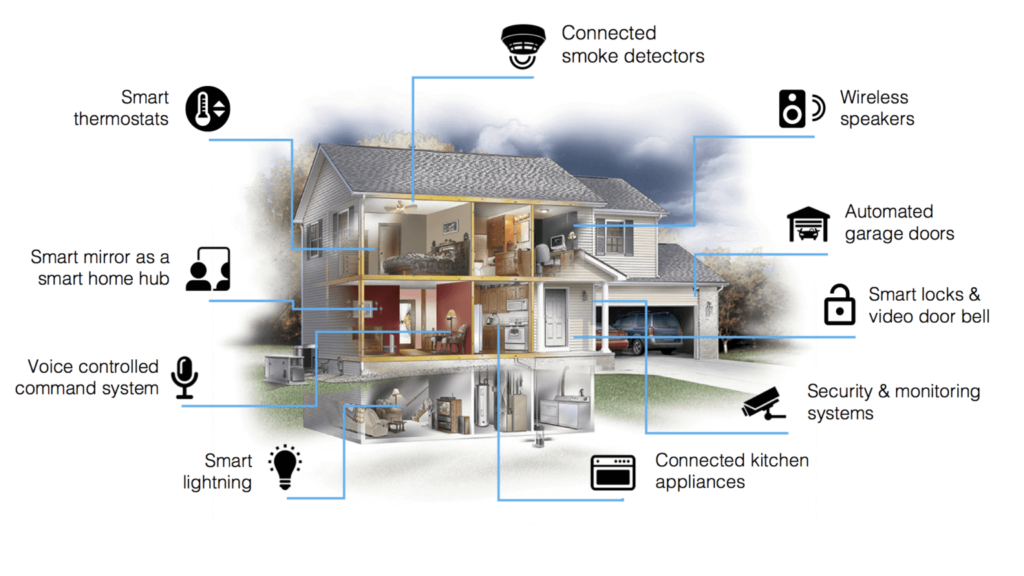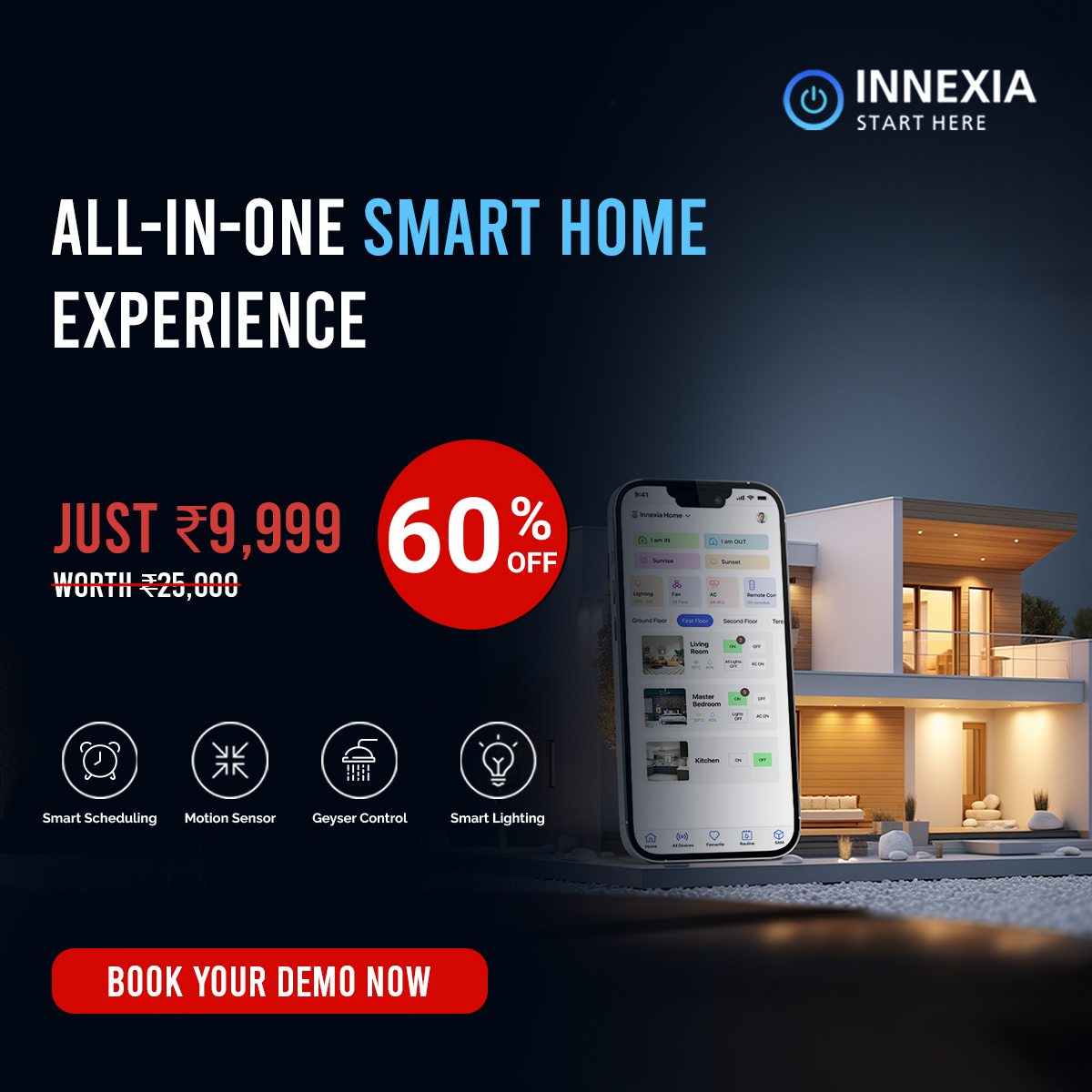As the global population ages, the number of elderly individuals and people with disabilities is steadily rising. While many seniors and disabled people desire to live independently in their own homes, everyday tasks can become increasingly difficult due to physical limitations or health conditions.
Imagine struggling to reach a light switch in a dark room, or fumbling with medication bottles. These seemingly simple tasks can pose significant challenges.
Fortunately, advancements in technology offer a solution: home automation systems.
Innexia, a leading Indian Home Automation Company, offers user-friendly solutions that fit seamlessly into your life. Innexia bridges the gap between cost and smart living.
Providing devices that fit your budget and integrate into your daily routine.
This makes every day a bit easier and a lot more comfortable. With Innexia’s smart home technology, you can create a safe and supportive environment that empowers independence and security for yourself or your loved ones.
What is a Home Automation System?

A home automation system is a network of devices and apps that work together to control features in your living space automatically. This includes things like lights, thermostats, appliances, and even security systems.
With a home automation system, you can program these devices to work for you, making everyday tasks easier and your home environment more comfortable and secure. This is especially helpful for seniors and disabled people who may face challenges with mobility or memory.
Benefits Of Home Automation System For Elderly And Disabled
1. Increased Independence
Daily tasks such as turning on lights or adjusting the thermostat can become challenging for the elderly and disabled. Home automation systems empower these individuals by promoting independence.
Voice control
Gone are the days of struggling to reach light switches. With voice assistants like Google Assistant or Amazon Alexa, you can control lights, appliances, and even thermostats with simple voice commands. This eliminates the need to navigate your home and provides greater control over your environment.
Automated reminders
Forgetfulness can be a concern, but smart home systems offer a helping hand. Program automated reminders for medication, appointments, or even walks. These reminders can be delivered through voice commands or visual displays, helping you maintain routines and schedules independently.
Remote access
With internet-connected systems, control extends beyond your physical location. Imagine adjusting the temperature before arriving home or locking the door remotely. This allows for increased independence and a sense of security, especially for those who may require occasional assistance.
2. Safety and Security
Living independently often comes with safety concerns. Home automation systems address these concerns, boosting your home’s security and offering peace of mind.
Emergency Alerts
Imagine a fall sensor triggering an emergency alert, sending help right away. This gives you and your loved ones peace of mind, knowing assistance is just a moment away.
Door Security
Monitor entry points remotely with smart locks featuring camera integration. See who’s at your door from your phone or smart lock it securely even when you’re out. This adds an extra layer of control over your home.
Proactive Safeguards
Smart home systems act as vigilant guardians. Leak detectors alert you to water leaks before damage occurs. Smart smoke alarms notify you and emergency services in case of a fire. Automatic shut-off features for appliances can prevent accidents by stopping electrical flow if a problem is detected. These features turn your home into a proactive partner in keeping you safe.
3. Comfort and Convenience
Imagine a home that anticipates your needs, creating a comfortable and convenient environment. Home automation systems go beyond just safety, offering features that elevate your daily life with ease of use and relaxation in mind.
Climate Control
Smart thermostats learn your preferences and adjust the temperature automatically, keeping you comfortable all day. No more fiddling with settings.
Voice-Controlled Entertainment
Voice-controlled entertainment systems let you control your TV, music, and even lighting with simple commands. This eliminates the need for remotes and provides a hands-free way to create the ideal ambience.
Automated Window Treatments
Adjusting window treatments can be a hassle, especially with limited mobility. Smart blinds and shades can be programmed to open and close automatically, responding to sunlight or your preferences. This adds convenience and helps regulate temperature and energy use.
Reduced Physical Strain
Keeping a clean and well-watered home can be physically demanding. Automated cleaning devices like robot vacuums tackle dust and dirt, while smart irrigation systems keep your lawn and garden flourishing without manual work. These features reduce physical strain, freeing up your time for activities you enjoy.
4. Peace of Mind for Caregivers and Loved Ones
Home automation systems aren’t just beneficial for elderly and disabled individuals living independently. We also offer significant peace of mind for caregivers and loved ones.
Remote Monitoring
Video cameras or motion sensors let caregivers see if their loved one is active or needs help. This reduces worry and provides reassurance about their well-being.
Reduced Supervision
Constant supervision can be tiring for everyone. Automation helps. If medication isn’t dispensed on time or a door is left open, the system sends alerts. Caregivers can intervene when needed, reducing the need for constant monitoring and providing timely notification of potential issues.
Remote Management
Smart home systems often allow caregivers to manage aspects of the home environment remotely. This provides additional support and ensures a comfortable living space for loved ones, even when caregivers can’t be there physically.
5. Considerations and Implementation
Home automation promises a world of convenience and security, but before diving in, consider some key factors.
Plan for Success
Budget, technical skills, and individual needs matter. We guide you in assessing your needs and finding systems that fit your budget and comfort level.
Prioritize Accessibility
User-friendly interfaces and voice control are crucial. These features make the system easier to use and manage for elderly and disabled individuals.
Find the Right Help
Many installers specialize in systems for seniors and disabled people. We can connect you with qualified professionals for a smooth installation.
Conclusion
Home automation empowers elderly and disabled individuals to manage daily tasks with ease. From effortless climate control to voice-activated entertainment, these systems simplify life and enhance safety. Caregivers gain peace of mind knowing their loved ones are comfortable and secure.
As a leading home automation company in Ahmedabad, Innexia Marketing can create a customized smart home that promotes well-being. Let technology empower you to live life to the fullest.
FAQ
Security is paramount. Choose systems with strong security protocols to protect against hacking. Consider having battery backups or alternative power sources for essential devices in case of outages. Remember, it’s important to maintain a reliable communication system for emergencies, regardless of the automation system in place.
Home automation systems are designed for ease of use. Features like clear icons, simple interfaces, and voice control can make them user-friendly, especially for those with limited mobility. Compatibility with existing devices or easy installation options further reduce complexity. So, while some systems may require more technical knowledge, many cater to a broad range of users.
Innexia (home automation company in Surat)offers a comprehensive range of home automation solutions, including smart lighting, climate control, security systems, and voice-activated devices. We provide customized setups tailored to individual needs, ensuring maximum comfort and convenience for their clients.




